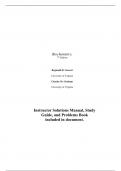Biochemistry,
7th Edition
Reginald H. Garrett
University of Virginia
Charles M. Grisham
University of Virginia
Instructor Solutions Manual, Study
Guide, and Problems Book
included in document.
,Table of Contents
Preface
Chapter 1 - The Facts of Life: Chemistry Is the Logic of Biological Phenomena
Chapter 2 - Water: The Medium of Life
Chapter 3 - Thermodynamics of Biological Systems
Chapter 4 - Amino Acids and the Peptide Bond
Chapter 5 - Proteins: Their Primary Structure and Biological Functions
Chapter 6 - Proteins: Secondary, Tertiary, and Quaternary Structure
Chapter 7 - Carbohydrates and the Glycoconjugates of Cell Surfaces
Chapter 8 - Lipids
Chapter 9 - Membranes and Membrane Transport
Chapter 10 - Nucleotides and Nucleic Acids
Chapter 11 - Structure of Nucleic Acids
Chapter 12 - Recombinant DNA: Cloning, Chimeric Genes, and Synthetic Biology
Chapter 13 - Enzymes—Kinetics and Specificity
Chapter 14 - Mechanisms of Enzyme Action
Chapter 15 - Enzyme Regulation
Chapter 16 - Molecular Motors
Chapter 17 - Metabolism: An Overview
Chapter 18 - Glycolysis
Chapter 19 - The Tricarboxylic Acid Cycle
Chapter 20 - Electron Transport and Oxidative Phosphorylation
Chapter 21 - Photosynthesis
,Chapter 22 - Gluconeogenesis, Glycogen Metabolism, and the Pentose
Phosphate Pathway
Chapter 23 - Fatty Acid Catabolism
Chapter 24 - Lipid Biosynthesis
Chapter 25 - Nitrogen Acquisition and Amino Acid Metabolism
Chapter 26 - Synthesis and Degradation of Nucleotides
Chapter 27 - Metabolic Integration and Organ Specialization
Chapter 28 - DNA Metabolism: Replication, Recombination, and Repair
Chapter 29 - Transcription and the Regulation of Gene Expression
Chapter 30 - Protein Synthesis
Chapter 31 - Completing the Protein Life Cycle: Folding, Processing, and Degradation
Chapter 32 - The Reception and Transmission of Extracellular Information
Glossary
, Chapter 1 The Facts of Life: Chemistry Is the Logic of
Biological Phenomena
•••••••••••••••••••••••••
Chapter Outline
• Properties of living systems
• Highly organized - Cells > organelles > macromolecular complexes >
macromolecules (proteins, nucleic acids, polysaccharides)
• Structure/function correlation: Biological structures serve functional purposes
• Energy transduction: ATP and NADPH –energized molecules
• Steady state maintained by energy flow: Steady state not equilibrium
• Self-replication with high, yet not perfect, fidelity
• Biomolecules
• Elements: Hydrogen, oxygen, carbon, nitrogen (lightest elements of the periodic
table capable of forming a variety of strong covalent bonds)
• Carbon -4 bonds, nitrogen -3 bonds, oxygen –2 bonds, hydrogen -1 bond
• Compounds: Carbon-based compounds –versatile
• Phosphorus- and sulfur-containing compounds play important roles
• Biomolecular hierarchy
• Simple compounds: H2O, CO2, NH4+, NO3–, N2
• Metabolites: Used to synthesize building block molecules
• Building blocks: Amino acids, nucleotides, monosaccharides, fatty acids, glycerol
• Macromolecules: Proteins, nucleic acids, polysaccharides, lipids
• Supramolecular complexes: Ribosomes, chromosomes, cytoskeleton
• Membranes: Lipid bilayers with membrane proteins
• Define boundaries of cells and organelles
• Hydrophobic interactions maintain structures
• Organelles: Mitochondria, chloroplasts, nuclei, endoplasmic reticulum Golgi, etc.
• Cells: Fundamental units of life
• Living state: Growth, metabolism, stimulus response and replication
• Properties of biomolecules
• Directionality or structural polarity
• Proteins: N-terminus and C-terminus
• Nucleic acids: 5’- and 3’- ends
• Polysaccharides: Reducing and nonreducing ends
Garrett & Grisham 1-1




